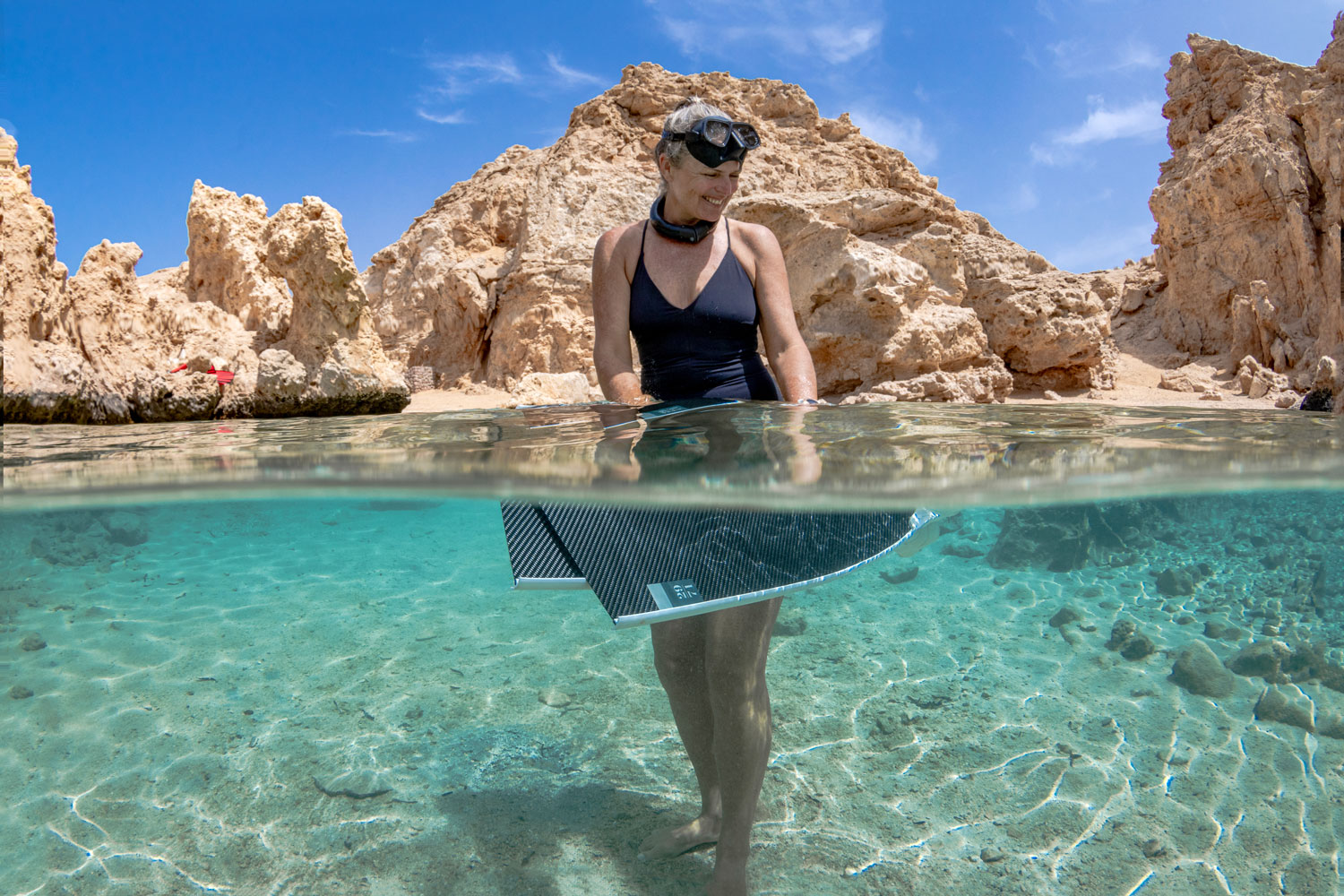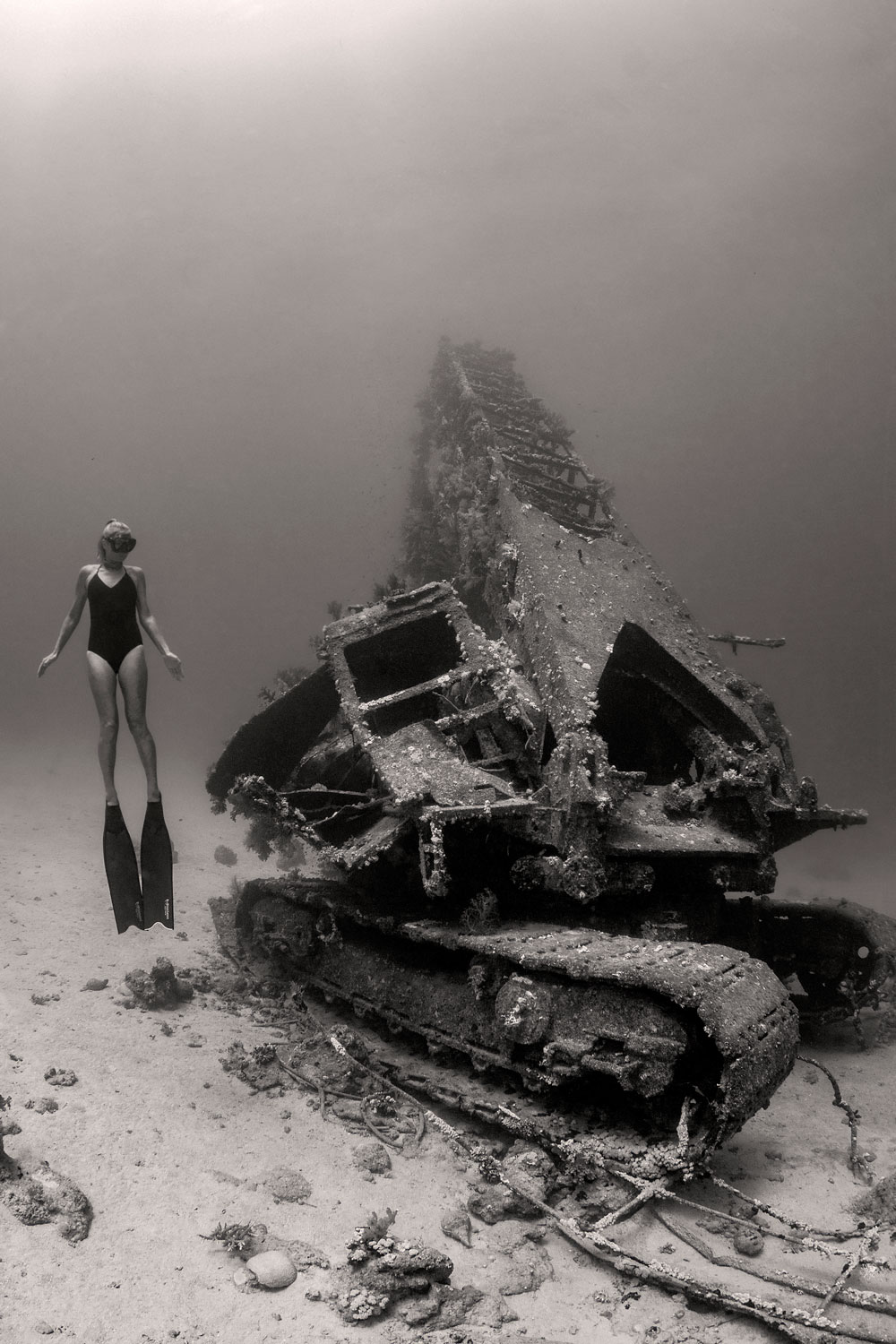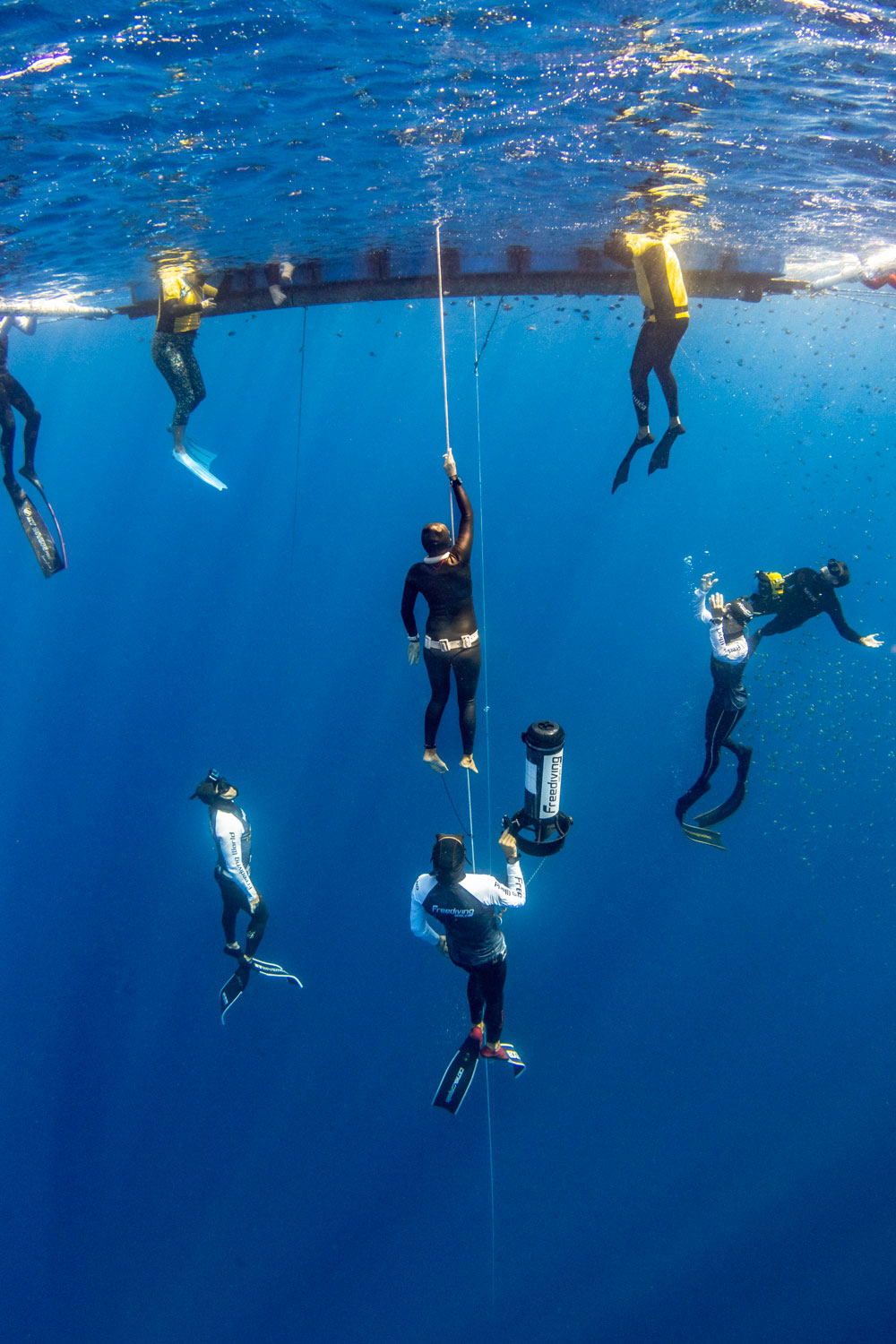Deep down with Ruth Osborn—one of the UK’s deepest female freedivers
Sea lover, yoga enthusiast, DAN Member. Ruth tells us what lies behind her records, and how she challenges the limits.
When I think of Ruth, I always imagine her as I photographed her: dressed in elegant simplicity, and immersed in the colors of the coral reef, while she looks with amazement and happiness at the thousand marine creatures that surround her. I have to stop and remember that most days, she lives in a very different environment where she cannot be distracted by looking at the fish or admiring the corals, but must be focused on herself.
In fact, she is a British champion of free immersion, a discipline, without the use of fins, that requires descending and ascending in the water column by pulling one’s self up and down with a rope.
In May 2023 she broke one of the longest-standing records in the history of freediving – the national British Free Immersion record that had stood for 15 years, with a dive to 82 meters. She’s the second deepest British woman ever and she’s still far from her limits.

Ruth was born to English parents in the Scottish highlands but grew up in a few different places. Her childhood was mostly in Scotland but also included three years living in Hong Kong, something she considers to have had a significant impact on her adult life.
Since 2011 Ruth has spent winters traveling and surfing and has lived all over the world, including Morocco, Portugal, Tenerife, Costa Rica, Sri Lanka, Bali and Mexico.
In January 2020, Ruth traveled to freediving mecca, Dahab (Egypt) for the first time, to spend a month freediving, and her love for it deepened. Since then, Dahab became her winter home and her focus shifted from surfing to freediving.
Her first freediving competition was in October 2020 and I met her for the first time that winter. By September 2021, Ruth was already part of the British team at the Association Internationale pour le Développement de l’Apnée (AIDA) Freediving World Championships. She currently lives in Sharm el Sheikh, where she is training at Freediving World, the diving center founded by the late Freediver Andrea Zuccari, and to my great pleasure I get to see her more often.

She likes to train here because the set up and safety is of the highest level, and conditions in the winter are favorable for freediving. They also run regular competitions.
To compete in freediving at world class level requires many sacrifices and above all motivation and enthusiasm. It requires long periods of regular training, and much more than just diving deep. Ruth’s training involves gym, pool apnea, dry practices on equalization, stretching, visualization, mediation, nutrition, good rest and sleep and continuous attention to maintaining physical and mental well-being and balance. She must always keep in mind the many aspects of preparation aimed at achieving lasting progress.
It is also important to remember not to associate with people who can be annoying and damage your mental balance! Like most things in life, you have to consistently put in the effort to make it feel very natural as well.
Ruth tells me that with freediving, she has found a sport that joins the dots of everything she has done before. Her experiences as a swimmer, a yogi, meditator, fitness trainer, along with her interest in mostly plant based nutrition and her love of the water, all come together to help her in freediving.

She draws on a “collection of tools” for this discipline, like yoga, that help her to perform and live well. In fact, yoga, the union of body and mind, plays an important part in her freediving. Her background in yoga and meditation has given her an awareness of body and mind, awareness of breathing, and skills to maintain concentration and not get involved with the outside world. When she goes up and down from the surface she cannot afford any distractions; only her, the rope and her intention.
She must always keep in mind the many aspects of preparation: breathing, movements , which must be as energy-intensive as possible, the gym sessions and diets: all aimed at achieving lasting progress.
I often went with her and photographed her training sessions, both in the pool and in open water. When I watched her dive and descend down the rope, it always seemed to me that everything was easy, calm, natural. And it really is for her!
These are the results of the intense preparatory work that I was able to learn about only by observing her activity, which seemed truly remarkable to me.
I am very grateful to Ruth because her presence, her welcoming gaze and thoughtful and kind manner, evokes in me a calmness and serenity, that I often need in today’s complex life.

I have often wondered what inspired her to become a freediver, and I asked her this question.
I’d known about freediving for a long time before I finally felt the desire to experience it myself. I started in 2015, curious to experience the water, and myself in the water, in a different way to swimming or surfing.
Initially I didn’t have an interest in pursuing depth, I was happy to simply spend more time under the water. That changed when I experienced the free-fall for the first time, my curiosity for depth was awakened!! I fell in love with the peace and calm feelings of freediving, the disconnect from the world on land, and the connection to oneself.
What aspects of your life did you have to give up and how much the sacrifice cost you?
My whole life now is organized around my freediving training and competitions. The biggest, and hardest, sacrifice for me has been how little time I spend in the water purely for the pleasure, whether it’s surfing or exploring coral reefs and hopefully meeting marine life. It’s something I miss a lot. But life is all about choices and in the grand scheme of things what I get from freediving is so much greater than anything else, and so the sacrifices are worth it.
I also live and travel to places that I wouldn’t necessarily choose to go to if I wasn’t freediving, and this can also be tough. There’re so many incredible places in the world I’d still love to experience, but I trust, everything will come in time.

What are the most dangerous aspects of this discipline?
There is danger if safety protocols aren’t followed, but our sport has high safety standards which mitigates a lot of risk.
The first line of safety is with me. I have to be aware, and honest, with myself about my physical and mental state on any day to be able to perform. And I have to be aware, and honest, about any external conditions (if there is current, or swell) and how that might affect me.
If something does not feel right on a dive, I have to be aware, to listen and be able to evaluate what that is and what action needs to be taken. Sometimes that might mean aborting a dive early and that can be a hard decision to make, especially in a competition. It can be dangerous if I listen to my ego at the expense of what intuition is telling me.
In competitive freediving the drive to achieve depth and results can be dangerous if not backed with a steady and safe progression, and having good skills; the depth really has to be earned.

How do you see your future?
Haha deeper 🙂
I don’t like to talk about my goals so much, but you’ll see when I achieve them (you can follow me on instagram @ruthosbornfreediver).
At the moment I’m only training and competing in Free Immersion, I’d like to do the other disciplines as well, and I’m hoping to get financial sponsorship, it would help a lot.
I’d like to be sharing the tools I use as a freediver with others to help improve quality of life. So many of the practices I use for freediving; mindfulness, meditation, correct diaphragmatic breathing, deep relaxation, and the way I live with good nutrition, rest and sleep, are beneficial for everyone in daily life. I’m excited that I am able to start to share these skills. And to be in the water for the sheer joy of it!
Surfing and exploration—I hope there are some expeditions in my future. I’d love to go back to Revillagigedo Islands off the Pacific coast of Mexico and freedive with the pelagic marine life there. Also to experience Antarctica would be incredible. There are so many other places I’d like to experience, and in doing so hopefully raise the awareness of those who aren’t so connected with the water, about the importance of looking after this precious, miraculous planet that we are so lucky to live on.
About the author
Renata Romeo, an interior designer in Milan, became a PADI Master Scuba Diving Trainer in the Red Sea, and wanting to capture memories of her dives, studied to become an underwater photographer.
Love, admiration and respect for sea creatures, especially turtles, helped her win awards in the most important international competitions such as the UPY, Ocean Geographic, Underwater Photo Marathon and Dive Photo Guide’s Competitions.
Recently, she dedicated herself to freediving and portraying freedivers in her work, and she is committed to the protection and conservation of nature and the seas.


